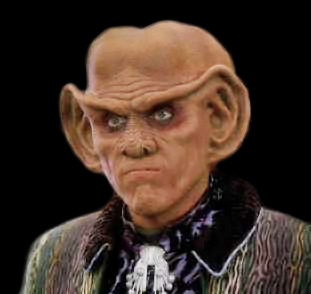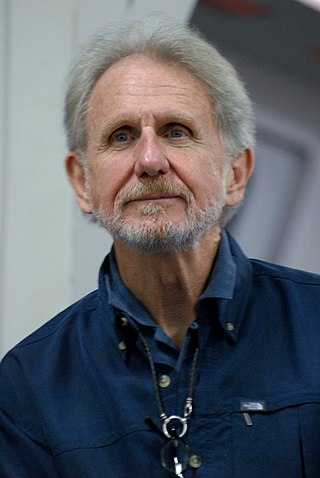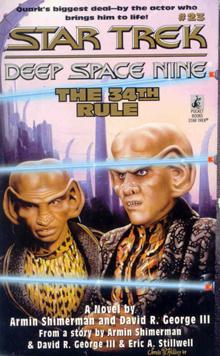Related Research Articles
Star Trek: Deep Space Nine (DS9) is an American science fiction television series created by Rick Berman and Michael Piller. The fourth series in the Star Trek media franchise, it originally aired in syndication from January 3, 1993, to June 2, 1999, spanning 176 episodes over seven seasons. Set in the 24th century, when Earth is part of a United Federation of Planets, its narrative is centered on the eponymous space station Deep Space Nine, located adjacent to a wormhole connecting Federation territory to the Gamma Quadrant on the far side of the Milky Way galaxy.

The Ferengi are a fictional extraterrestrial species in the American science fiction franchise Star Trek. They were devised in 1987 for the series Star Trek: The Next Generation, played a prominent role in the following series Star Trek: Deep Space Nine, and have made brief appearances in subsequent series such as Star Trek: Voyager, Star Trek: Enterprise, Star Trek: Discovery, Star Trek: Lower Decks and Star Trek: Picard.

Quark is a fictional character in the American television series Star Trek: Deep Space Nine. He was played by Armin Shimerman and is a member of the extraterrestrial race known as the Ferengi, who are stereotypically capitalist and motivated only by profit.
The Dominion War is an extended plot concept developed in several story arcs of Star Trek: Deep Space Nine, an American science-fiction television series produced by Paramount Pictures. In the fictional Star Trek universe, the Dominion War is a conflict between the forces of the Dominion, the Cardassian Union, and, eventually, the Breen Confederacy against the Alpha Quadrant alliance of the United Federation of Planets, the Klingon Empire and, later, the Romulan Star Empire. The war takes place in the final two seasons of the series, but is gradually built up to over the course of the five preceding seasons.

Rom is a recurring character on Star Trek: Deep Space Nine. He is played by Max Grodénchik.
Ishka is a fictional character from the science fiction television series Star Trek: Deep Space Nine (DS9). A female Ferengi, she is the mother of Quark and Rom. Ishka appears in five canon episodes of DS9, and also features in seven licensed-but-non-canon Star Trek novels.
"Rules of Acquisition" is the seventh episode of the second season of the American science fiction television series Star Trek: Deep Space Nine. It is the 27th episode overall.
"The Maquis" is a two-part episode from the second season of the television series Star Trek: Deep Space Nine.
"The Nagus" is the 11th episode of the American science fiction television series Star Trek: Deep Space Nine.
"Body Parts" is the 97th episode of the television series Star Trek: Deep Space Nine and the 24th episode of the fourth season.

Ira Steven Behr is an American screenwriter and television producer, best known for his work on Star Trek, especially Star Trek: Deep Space Nine, on which he served as showrunner and executive producer. He was the executive producer and showrunner on Crash, executive producer on Syfy's Alphas and a writer and co-executive producer on Outlander.
"The Emperor's New Cloak" is the 162nd episode of the television series Star Trek: Deep Space Nine. The 12th episode of the seventh season. It premiered the week of February 1, 1999 to Nielsen ratings of 4.6.

"Family Business" is the 69th episode of the television series Star Trek: Deep Space Nine, the 23rd episode of the third season. It was written by Ira Steven Behr and Robert Hewitt Wolfe, and directed by Rene Auberjonois. The episode had Nielsen ratings of 6.9 points when it was first broadcast.
"Little Green Men" is the 80th episode of the American syndicated science fiction television series Star Trek: Deep Space Nine, the eighth episode of the fourth season.

"The Magnificent Ferengi" is the tenth episode of the sixth season of Star Trek: Deep Space Nine, the 134th episode overall, originally aired in syndication on December 29, 1997. It was written by Ira Steven Behr and Hans Beimler, and directed by Chip Chalmers. The title is a reference to the film The Magnificent Seven, and the episode makes several minor homages to the film.
"Prophet Motive" is the 62nd episode of the television series Star Trek: Deep Space Nine and is the sixteenth episode of the third season. In the episode, Grand Nagus Zek comes to the station to present Quark with a revised copy of the Rules of Acquisition, which is now a guide for generosity and benevolence.
"Ferengi Love Songs" is an episode of Star Trek: Deep Space Nine, the twentieth episode of the fifth season.

Deep Space Nine is a fictional space station, the eponymous primary setting of the American science fiction television series Star Trek: Deep Space Nine which aired from 1993 to 1999. It serves as a base for the exploration of the Gamma Quadrant via the Bajoran wormhole and is a hub of trade and travel for the sector's denizens. It is run by a joint crew of Starfleet and Bajoran officers and it is the home port of a number of Starfleet runabouts, as well as the starship USS Defiant.

The 34th Rule (ISBN 0-671-00793-9), published January 1, 1999, is a Star Trek: Deep Space Nine novel written by Armin Shimerman and David R. George III. The story in the novel was an allegory for the internment of Japanese Americans during the Second World War, and was inspired by George Takei's experiences during that period. It had originally been pitched as an episode to Deep Space Nine, but was subsequently turned into a novel.
References
- 1 2 "The Maquis: Part 1". Star Trek: Deep Space Nine (Television production). Season 2. Episode 20. Event occurs at 23:00.
- ↑ Kraemer, Ross Shepard; Kraemer, Ross; Cassidy, William; Schwartz, Susan L. (2003). Religions of Star Trek. Westview Press. pp. 3, 180. ISBN 9780813341156.
- ↑ "Rules of Acquisition". Star Trek: Deep Space Nine (Television production). Season 2. Episode 7. Event occurs at 3:00.
- ↑ Taylor, Mary P. (2002). Adventures in Time and Space. Simon and Schuster. p. 483. ISBN 9780743455930.
- ↑ "False Profits". Star Trek: Voyager (Television production). Season 3. Episode 5.
